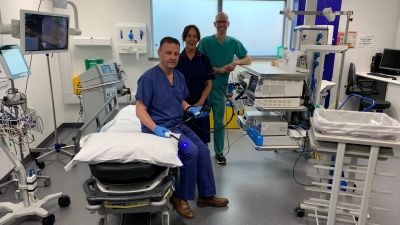UK trial for GI Genius AI device could cut bowel cancer deaths

A clinical trial using AI has the potential to save lives lost to bowel cancer, say researchers involved in the study.
The clinical trial of the artificial intelligence (AI) device has recruited its final patient.
The team behind the study, which is the largest trial of its kind in the world, is now looking at how it can save lives.
The GI Genius is designed to help clinicians to identify polyps during colonoscopies – the examinations used to detect changes or abnormalities in the bowel.
Bowel cancer is the UK's second biggest cancer killer and kills around 16,800 people each year.
Professor Colin Rees, a Consultant Gastroenterologist at South Tyneside and Sunderland NHS Foundation Trust (STSFT), who led the COLO-DETECT study, said there are many ways AI could be used to transform medicine as it can analyse details much quicker than people can.
He said: “AI can be used to look at data, it can be used for things like detection, as in the COLO-DETECT study, for imaging and it's very good at picking up patterns in data or results.
“So AI will be, without question, a major tool used by medicine in the coming years."
Most bowel cancers develop from a type of polyp – small growths on the inner lining of the large intestine (colon) or rectum – that becomes cancerous.
It is important to find as many polyps as possible to decide whether they need to be removed, as this may prevent a polyp becoming cancerous in the future.
GI Genius integrates with existing colonoscopy equipment and analyses images from the camera in real-time, highlighting any areas it thinks may contain a polyp, which can often be missed by the human eye. These areas can then be inspected more closely to determine if a polyp is present and whether it should be removed.
The study was funded by Medtronic and involved nine NHS endoscopy units from across the country, recruiting more than 2,000 patients.
Want a quick and expert briefing on the biggest news stories? Listen to our latest podcasts to find out What You Need To know...